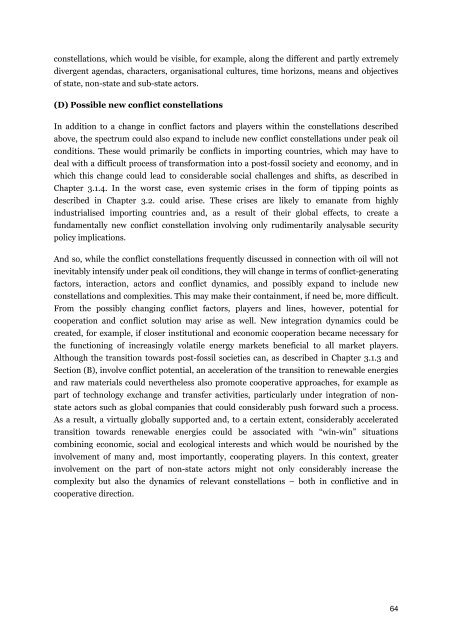PEAK OIL
PEAK OIL
PEAK OIL
Create successful ePaper yourself
Turn your PDF publications into a flip-book with our unique Google optimized e-Paper software.
constellations, which would be visible, for example, along the different and partly extremely<br />
divergent agendas, characters, organisational cultures, time horizons, means and objectives<br />
of state, non-state and sub-state actors.<br />
(D) Possible new conflict constellations<br />
In addition to a change in conflict factors and players within the constellations described<br />
above, the spectrum could also expand to include new conflict constellations under peak oil<br />
conditions. These would primarily be conflicts in importing countries, which may have to<br />
deal with a difficult process of transformation into a post-fossil society and economy, and in<br />
which this change could lead to considerable social challenges and shifts, as described in<br />
Chapter 3.1.4. In the worst case, even systemic crises in the form of tipping points as<br />
described in Chapter 3.2. could arise. These crises are likely to emanate from highly<br />
industrialised importing countries and, as a result of their global effects, to create a<br />
fundamentally new conflict constellation involving only rudimentarily analysable security<br />
policy implications.<br />
And so, while the conflict constellations frequently discussed in connection with oil will not<br />
inevitably intensify under peak oil conditions, they will change in terms of conflict-generating<br />
factors, interaction, actors and conflict dynamics, and possibly expand to include new<br />
constellations and complexities. This may make their containment, if need be, more difficult.<br />
From the possibly changing conflict factors, players and lines, however, potential for<br />
cooperation and conflict solution may arise as well. New integration dynamics could be<br />
created, for example, if closer institutional and economic cooperation became necessary for<br />
the functioning of increasingly volatile energy markets beneficial to all market players.<br />
Although the transition towards post-fossil societies can, as described in Chapter 3.1.3 and<br />
Section (B), involve conflict potential, an acceleration of the transition to renewable energies<br />
and raw materials could nevertheless also promote cooperative approaches, for example as<br />
part of technology exchange and transfer activities, particularly under integration of nonstate<br />
actors such as global companies that could considerably push forward such a process.<br />
As a result, a virtually globally supported and, to a certain extent, considerably accelerated<br />
transition towards renewable energies could be associated with “win-win” situations<br />
combining economic, social and ecological interests and which would be nourished by the<br />
involvement of many and, most importantly, cooperating players. In this context, greater<br />
involvement on the part of non-state actors might not only considerably increase the<br />
complexity but also the dynamics of relevant constellations – both in conflictive and in<br />
cooperative direction.<br />
64


